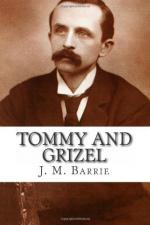She no longer sought to teach Tommy how he should write. That quaint desire was abandoned from the day when she learned that she had destroyed his greatest work. She had not destroyed it, as we shall see; but she presumed she had, as Tommy thought so. He had tried to conceal this from her to save her pain, but she had found it out, and it seemed to Grizel, grown distrustful of herself, that the man who could bear such a loss as he had borne it was best left to write as he chose.
“It was not that I did not love your books,” she said, “but that I loved you more, and I thought they did you harm.”
“In the days when I had wings,” he answered, and she smiled. “Any feathers left, do you think, Grizel?” he asked jocularly, and turned his shoulders to her for examination.
“A great many, sir,” she said, “and I am glad. I used to want to pull them all out, but now I like to know that they are still there, for it means that you remain among the facts not because you can’t fly, but because you won’t.”
“I still have my little fights with myself,” he blurted out boyishly, though it was a thing he had never meant to tell her, and Grizel pressed his hand for telling her what she already knew so well.
The new book, of course, was “The Wandering Child.” I wonder whether any of you read it now? Your fathers and mothers thought a great deal of that slim volume, but it would make little stir in an age in which all the authors are trying who can say “damn” loudest. It is but a reverie about a child who is lost, and his parents’ search for him in terror of what may have befallen. But they find him in a wood singing joyfully to himself because he is free; and he fears to be caged again, so runs farther from them into the wood, and is running still, singing to himself because he is free, free, free. That is really all, but T. Sandys knew how to tell it. The moment he conceived the idea (we have seen him speaking of it to the doctor), he knew that it was the idea for him. He forgot at once that he did not really care for children. He said reverently to himself, “I can pull it off,” and, as was always the way with him, the better he pulled it off the more he seemed to love them.
“It is myself who is writing at last, Grizel,” he said, as he read it to her.
She thought (and you can guess whether she was right) that it was the book he loved rather than the children. She thought (and you can guess again) that it was not his ideas about children that had got into the book, but hers. But she did not say so; she said it was the sweetest of his books to her.




